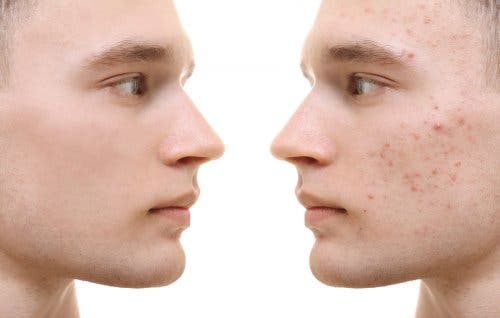"There's No Magic Solution for Treating Acne" – Rocío Gil Redondo

In the article below, we’ll talk about the importance of daily skincare when it comes to preventing and treating acne.
Our skin is the largest organ in the body and, though it may not seem like it, it requires daily care. Just the same, many people don’t pay a lot of attention to their skin. In fact, there are some who believe that certain measures are only necessary when people experience acne or another specific problem.
The truth is, caring for your skin isn’t only important when we experience dryness, acne, spots, or other imperfections. You need to care for our skin on a regular basis by implementing simple daily habits. For example, washing your face with the right products and applying sunscreen every day.
It’s true that many people establish a healthy skin care routine from the time they reach adolescence. However, others barely even worry about putting on sunscreen every day or hydrating their skin on a regular basis. It’s not until they begin to see signs of aging that they start to consider their importance.
Interview with dermatologist Rocío Gil Redondo
Medical dermatologist Rocío Gil Redondo explains that it’s best for children to adopt an integral skincare routine from the time they’re little.
She also states that when it comes to treating acne, “there’s no such thing as a magic solution” because it’s a complex condition. Therefore, the best thing you can do is consult a dermatologist and follow his or her instructions.
Q. What types of acne exist? Is it true there’s only one type and only one way to treat it?

There are different types of acne. On the one hand, we have comedonica, which consists of open comedos (blackheads) and closed comedos (whiteheads). Then, we have pustules or papules, which consist of red pimples with or without a white tip (pustules). And finally, we have nodulocystic acne, which causes painful swollen lesions underneath the skin.
At the same time, there are different ways to prevent the appearance of pimples in those who have a tendency toward acne. For example, applying specific cleansing and hydrating products as well as avoiding comedogenic lotions and makeups. However, once the condition sets in, additional medical measures are often necessary to get rid of the problem.
Q. Is there a magic solution for acne?
Unfortunately, there’s no such thing as a magic solution. It’s a matter of avoiding factors that tend to contribute to the appearance of pimples and treating each individual case accordingly.
Q. And what can we do about scars?
When it comes to treating acne scars, there are several treatment options. These include chemical peels, laser treatment, dermabrasion, and biophotonic therapy, which also treats active pimples. Mild cases of acne may improve with the use of products that contain glycolic acid or some retinoid.
Note: According to the MSD Manual, the failure of an acne treatment often has to do with a failure to adhere to and follow through with the treatment plan.
Q. What skincare habits should we include in our daily routine?
It’s important to wash your face and apply hydrating products that are right for your skin type on a daily basis. What’s more, you should apply sunscreen to prevent skin cancer and photo-aging.
One of the intervening measures in treating acne consists of applying proper sunscreen every day.
Q. Some say that eating certain foods can contribute to the appearance of acne. Is there any food we should avoid in particular?

Recent studies have concluded that diets that are high in milk products can make acne worse. This is especially true for individuals that consume low-fat milk as well as athletic protein drinks. Diets that have a high glycemic index can also be counterproductive.
In these cases, it’s generally best to cut out protein shakes and take in a more moderate amount of milk. Of course, a healthy, balanced diet is also important.
Q. We’re all concerned about the appearance of our skin, but attention to one’s personal appearance becomes more evident during adolescence. How can acne influence an adolescent’s self-esteem?
Acne can affect adolescents in a negative way given the aesthetic alterations that active pimples and residual scars cause. This can lead to feelings of embarrassment and a fear of being made fun of by their classmates. And, of course, that can affect a person’s social life.
Q. It seems like women tend to worry more about their physical appearance and caring for their skin. Is that true? Is it true that women are more likely to see a professional about these sort of concerns or is just a stereotype?
Historically, women were more concerned than men about skincare. However, it’s more and more common to find men that are caring for their skin and consulting dermatologists regarding aesthetic issues.
Q. Finally, are there any secrets to teaching children to care for their skin and their bodies from a young age?
Parents should get their children used to applying hydrating body and face lotions in cases of dry skin, which is very common in children. It’s important to apply sunscreen when children go to the beach, the pool, or spend time out in the sun. That way, these actions will become habits that children will practice for the rest of their lives.
In the article below, we’ll talk about the importance of daily skincare when it comes to preventing and treating acne.
Our skin is the largest organ in the body and, though it may not seem like it, it requires daily care. Just the same, many people don’t pay a lot of attention to their skin. In fact, there are some who believe that certain measures are only necessary when people experience acne or another specific problem.
The truth is, caring for your skin isn’t only important when we experience dryness, acne, spots, or other imperfections. You need to care for our skin on a regular basis by implementing simple daily habits. For example, washing your face with the right products and applying sunscreen every day.
It’s true that many people establish a healthy skin care routine from the time they reach adolescence. However, others barely even worry about putting on sunscreen every day or hydrating their skin on a regular basis. It’s not until they begin to see signs of aging that they start to consider their importance.
Interview with dermatologist Rocío Gil Redondo
Medical dermatologist Rocío Gil Redondo explains that it’s best for children to adopt an integral skincare routine from the time they’re little.
She also states that when it comes to treating acne, “there’s no such thing as a magic solution” because it’s a complex condition. Therefore, the best thing you can do is consult a dermatologist and follow his or her instructions.
Q. What types of acne exist? Is it true there’s only one type and only one way to treat it?

There are different types of acne. On the one hand, we have comedonica, which consists of open comedos (blackheads) and closed comedos (whiteheads). Then, we have pustules or papules, which consist of red pimples with or without a white tip (pustules). And finally, we have nodulocystic acne, which causes painful swollen lesions underneath the skin.
At the same time, there are different ways to prevent the appearance of pimples in those who have a tendency toward acne. For example, applying specific cleansing and hydrating products as well as avoiding comedogenic lotions and makeups. However, once the condition sets in, additional medical measures are often necessary to get rid of the problem.
Q. Is there a magic solution for acne?
Unfortunately, there’s no such thing as a magic solution. It’s a matter of avoiding factors that tend to contribute to the appearance of pimples and treating each individual case accordingly.
Q. And what can we do about scars?
When it comes to treating acne scars, there are several treatment options. These include chemical peels, laser treatment, dermabrasion, and biophotonic therapy, which also treats active pimples. Mild cases of acne may improve with the use of products that contain glycolic acid or some retinoid.
Note: According to the MSD Manual, the failure of an acne treatment often has to do with a failure to adhere to and follow through with the treatment plan.
Q. What skincare habits should we include in our daily routine?
It’s important to wash your face and apply hydrating products that are right for your skin type on a daily basis. What’s more, you should apply sunscreen to prevent skin cancer and photo-aging.
One of the intervening measures in treating acne consists of applying proper sunscreen every day.
Q. Some say that eating certain foods can contribute to the appearance of acne. Is there any food we should avoid in particular?

Recent studies have concluded that diets that are high in milk products can make acne worse. This is especially true for individuals that consume low-fat milk as well as athletic protein drinks. Diets that have a high glycemic index can also be counterproductive.
In these cases, it’s generally best to cut out protein shakes and take in a more moderate amount of milk. Of course, a healthy, balanced diet is also important.
Q. We’re all concerned about the appearance of our skin, but attention to one’s personal appearance becomes more evident during adolescence. How can acne influence an adolescent’s self-esteem?
Acne can affect adolescents in a negative way given the aesthetic alterations that active pimples and residual scars cause. This can lead to feelings of embarrassment and a fear of being made fun of by their classmates. And, of course, that can affect a person’s social life.
Q. It seems like women tend to worry more about their physical appearance and caring for their skin. Is that true? Is it true that women are more likely to see a professional about these sort of concerns or is just a stereotype?
Historically, women were more concerned than men about skincare. However, it’s more and more common to find men that are caring for their skin and consulting dermatologists regarding aesthetic issues.
Q. Finally, are there any secrets to teaching children to care for their skin and their bodies from a young age?
Parents should get their children used to applying hydrating body and face lotions in cases of dry skin, which is very common in children. It’s important to apply sunscreen when children go to the beach, the pool, or spend time out in the sun. That way, these actions will become habits that children will practice for the rest of their lives.
This text is provided for informational purposes only and does not replace consultation with a professional. If in doubt, consult your specialist.








